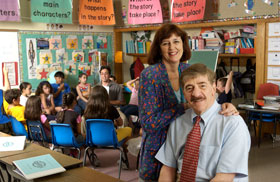  |
| HOME | THIS ISSUE | CALENDAR | GRANTS | BACK ISSUES | < BACK | NEXT > |
Software company outgrowth of educational research by Janice Palmer - September 18, 2006
|
||||||
| Two UConn educators have developed a web-based software and database company that helps teachers keep their students engaged in learning. The company, Renzulli Learning, which was founded a year ago, offers a website for elementary and high school students that matches their individual interests and learning styles with online resources. The website, www.RenzulliLearning.com, is based on more than 30 years of research by Neag School of Education professors Sally Reis and Joseph Renzulli. The two, internationally known and highly-regarded names in gifted education, set up the company with assistance from the University's research and development corporation. "Teachers using our system tell us it's like having a couple of teacher aides helping them in the classroom," says Renzulli, the namesake of this "Google" of enrichment learning and resources. Reis, his research colleague and wife, came up with the concept. She was in an urban classroom studying students identified as talented readers, and observed the teacher's struggle to keep the students engaged. Long before most of the class completed their assignments, these students would finish their work and the teacher would direct them to "go use the computer." Reis watched as the students surfed the web looking for information about their favorite celebrities. "I kept thinking, 'What can I do to make it easier for teachers in this situation?'" says Reis who, as a former classroom teacher, understands how difficult it can be to meet the needs of all students. "We know from research - some of it ours - that when curriculum is adjusted to meet individual student needs, and students are provided with enrichment opportunities, resources, and encouragement, their scores improve and they are happier, creative, and engaged learners," says Reis. So she and her team began book-marking what they considered enriching web sites they hoped to supply to teachers. But their effort really began taking shape when the University's Research and Development Corp. - a for-profit unit established to identify research with commercial appeal - approached Reis and Renzulli. "The truth is, without commercialization, a lot of great ideas and products never get off the shelf," says Renzulli, director of the National Research Center for the Gifted and Talented. After hearing of Reis's idea, UConn R&D introduced the couple to Michael Daversa, a UConn alum and successful education software entrepreneur, who saw potential in using their research to develop a software company. With the guidance of UConn R&D, a group of private venture capitalists was formed to create Renzulli Learning System LLC. It is based on the philosophies of the Schoolwide Enrichment Model (SEM) developed by Renzulli and Reis two decades ago - a model still used by hundreds of schools around the world to establish gifted and enrichment classes. Although its roots are in gifted education, the Renzulli Learning System is designed for all students, in grades two through 10. It can be purchased individually or as a site license, at a cost ranging from $10 to $40 per pupil, and can be accessed from home as well as from school. The student's first step in using the system is to create a profile by answering a series of questions.
From the answers, the student's three primary interest areas, learning styles, and preferred modes of expression are identified. A built-in search engine pulls from a bank of more than 15,000 resources, each vetted by the Renzulli group, to construct an extensive list of activities, projects, virtual tours, books, videos, and contests, all of which fall within the parameters set by the student's profile. The teacher serves as guide, taking students through the steps on how to use information to develop products or projects. Their work is saved in a personalized portfolio, and is accessible to the teacher and parent, as well as the student. Reis is proud of the elements built in for the teachers. "We made sure this system included tremendous resources for teachers," she says, "stellar material, easy to use, that ties into content standards." Justin Berman, principal of Intermediate School #187 in New York City, purchased a site license six months ago and made it available to his 950 students. He's enthusiastic about pairing student interests with online content that is filtered and screened, and particularly likes the portfolio. Once an activity is completed, students have the opportunity to assess their work and respond to questions about their favorite activities. "It brings their learning to another level," he says. "Not only are they completing an activity, there is a reflective piece that helps them process it all." Daversa, the company's CEO, says that in one year, the company has achieved "advanced market penetration." Currently, 600 schools in 37 states are clients, including school systems in New York City, Fort Worth, Oakland, Minneapolis-St. Paul, and Bermuda. The company, with 10 full-time and 15 part-time employees, hopes to turn a profit in a year or so. Both UConn and the Neag School would earn about 1 percent of the profit. For Renzulli and Reis, the dividends are already rolling in, in the form of positive feedback from teachers and students. "The payoff for me is being able to see kids in a classroom having fun with Renzulli Learning," Renzulli says. "It's about seeing what I passionately believe in, and what I fought on behalf of for so many years, now having the potential to reach hundreds of thousands of students." |
| ADVANCE HOME UCONN HOME |


